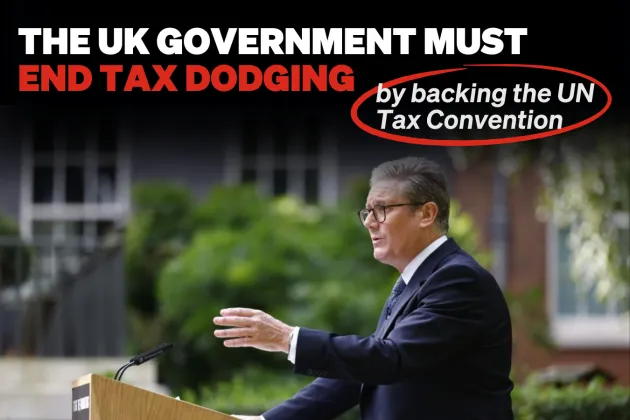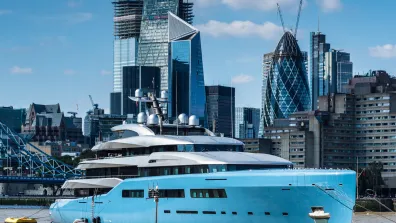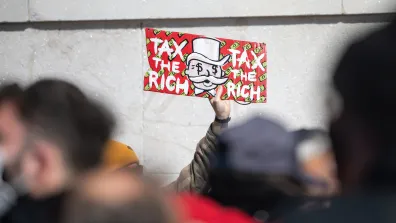Taxing extreme wealth for fairer, greener societies

Wealth inequality is spiralling. The richest 1% in the UK – around 685,500 people – now have more wealth than the poorest 70% of people combined. As new wealth is created, it’s mostly hoarded by the very richest. If we let this trend continue, we will see the first trillionaires within a decade.
While extreme wealth grows, extreme poverty remains unchanged – so the gap between the super-rich and poorest in society keeps growing. UK billionaires’ wealth has grown 1,000% since 1990, while poverty rates have barely moved in 20 years.
Globally, wealth is siphoned from the poorest nations to the richest individuals: in 2023, the richest 1% of people in Global North countries including the UK extracted £22.3 million every hour ($30 million) from the Global South1.
Our rigged global economic system generates extreme wealth and power for the already-rich, while keeping billions below the poverty line. It is a system designed this way. Borne out of colonial hierarchies that still shape global relations today, richer Global North individuals and countries extract wealth and resources from the Global South.
Meanwhile, public services crumble. Every pound stashed in a billionaire’s offshore account to avoid paying tax is a pound not spent on schools, hospitals – or on tackling the climate crisis. As the UK government cuts billions from welfare payments and international aid budgets, wealth at the top continues to surge.
Wealth is fuelling climate breakdown
Tackling the climate emergency requires vast public investment. To avoid the collapse of our climate, we need a just and equitable transition away from fossil-fuels, and towards greener societies and economies. But this transition needs funding – and that funding should come from those most responsible: the super-rich.
It would take 1,500 years for one of us in the bottom 99% to emit as much carbon as the world’s richest billionaires do in a single year – pollution from private jets, superyachts and from investments in polluting industries. Meanwhile, the poorest half of the world’s population emitted only 12% of global emissions in 20192.
The super-rich, and the Global North countries that they live in, have a responsibility to pay the money they owe for doing the most to cause the climate crisis – having released the most current and historic greenhouse gas emissions. Governments and the super-rich in the Global North must fund domestic transitions away from fossil fuels, support Global South countries to decarbonise fairly, and pay their climate debts.
The impact of wealth on democracy
Extreme wealth corrodes democracy. Elon Musk – the world’s richest man – has used his extreme wealth to propel himself to the centre of the US government. He has influenced politics by buying up Twitter/X and bankrolling US President Donald Trump. Once installed within the US government, he slashed public institutions, including the United States Agency for International Development (USAID), designed to support countries recovering from disasters and alleviate global poverty.
In the UK, billionaires own the majority of the media, including the Daily Mail, The Telegraph, The Times, The Independent, Talk TV and GB News. These billionaires bankroll right-wing think tanks such as Policy Exchange and the Institute of Economic Affairs, which shape public debate in favour of the super-rich. They fund political parties too: billionaire software CEO Frank Hester gave £20 million to the Conservatives, businessman Gary Lubner gave £6 million to Labour, and a handful of property developers gave millions to Reform UK.
The UK media and government should not be dictated to by the power and opinions of the super-rich. But the more that inequality grows in our societies, the more wealth and therefore power becomes concentrated in the hands of just a few people.
Wealth taxes can reduce inequality
To solve the intersecting crises of inequality, climate breakdown, and eroding democracy, we need to tax wealth. But the UK tax system currently does the opposite, heaping higher taxes on workers’ wages (20% on income between £12k-£50k) than on billionaires’ assets (0%). And a wealth tax is popular: three in four people in the UK support taxing the super-rich to fund public services3.
Despite what right-wing think tanks and billionaire-owned newspapers claim, there is very little evidence to suggest the super-rich will flee the UK if asked to pay their fair share of taxes. When Norway raised its wealth tax, only 0.01% of the wealthy left4. Spain and Switzerland have maintained successful wealth taxes without driving out billionaires.
Wealth taxes can also be designed to prevent tax dodging – the UK loses £40 billion to tax dodging each year. Exit taxes applied when people move abroad, retroactive rules for recent UK residents, and the taxation of immovable assets, such as UK properties or business shares, would make it difficult for wealth to escape to an overseas tax haven.
Given the extreme economic, environmental and political harm caused by the super-rich, the UK government must create a tax policy which puts an upper limit on individuals’ wealth – an 'extreme wealth line' as the New Economics Foundation has called it5. Scholars have suggested that in rich European companies such as the UK, this cap could be set at around €10 million per person, which could greatly reduce the harm caused by the super-rich6.
Moreover, a tax targeting those with over £10 million in assets would affect only around 75,000 people – 0.1% of the UK’s population – or roughly the population of Woking. On an average UK salary of £37,430 a year, it would take 267 years to save £10 million – if you didn’t spend a penny. 75,000 is a relatively small number, making enforcement easier, ultimately limiting tax dodging – especially if the UK government used some of the tax revenue to properly funded HM Revenue & Customs to carry out this work.
In 2022, after Russia invaded Ukraine, the UK froze £7 billion of Russian billionaire Roman Abramovich’s assets, including Chelsea Football Club. While the circumstances were exceptional, it shows that governments can act when they choose to.
Wealth taxes aren’t just helpful, they’re essential
A 2% tax on assets over £10 million, as Spain has done, could be introduced immediately to raise urgent funds for public services and action on climate.
But modest wealth taxes won’t shrink the extreme fortunes of the super-rich. To reverse the runaway accumulation of extreme wealth, further measures are needed.
The UK government must also back efforts to build a fairer international tax system – by supporting the UN Tax Convention, which is currently being negotiated at the United Nations. The UN Tax Convention aims to clamp down on tax dodging globally, and make big corporations and the super-rich pay their fair share back to the communities and countries they live and operate in.
A truly just, equitable and ecological transition away from fossil-fuels, and towards a fairer greener economy is possible and affordable – if wealth and resources are redistributed fairly to pay for the necessary changes.
But this isn’t just about raising public money. Extreme wealth is causing harm to our societies, democracies and to the planet – taxing wealth is about tackling inequality, rebalancing power, and averting climate collapse.
Share this page
- 1
https://www.oxfam.org.uk/media/press-releases/billionaire-wealth-surges-thr…
- 2
https://www.oxfam.org.uk/media/press-releases/richest-1-emit-as-much-planet…
- 3
https://www.oxfam.org.uk/media/press-releases/three-quarters-of-british-pub…
- 4
- 5
https://neweconomics.org/2025/01/exploring-an-extreme-wealth-line
- 6
https://www.penguin.co.uk/books/451473/limitarianism-by-robeyns-ingrid/9781…



